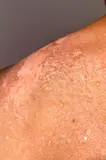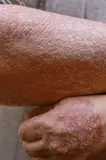Many topical ointments, moisturizers, and lotions can help alleviate eczema symptoms. Some specific types of eczema, like allergic contact dermatitis, can be treated with appropriate intervention.
The itchy/dry skin condition.
Commonly known by its itchy, dry skin symptoms, eczema appears as inflamed areas across the body. Areas of the skin become weakened, leading to thinned barriers to retain moisture to fight against external factors. These weakened areas lose the ability to affectively protect against normal environmental changes.
Many will experience eczema at some point in their lifetime, with approximately 31 million Americans suffering from its symptoms. While there is no cure, most diagnoses are treated with basic over the counter (OTC) topical creams, moisturizers, or oral medications.
If you begin to notice skin irritations similar to the signs and symptoms of eczema, contact our specialists today to schedule an appointment. Living with a form of dermatitis is manageable with expert treatment from our team at Idaho Dermatology.

Eczema
Signs & Symptoms
-
Dry and bumpy skin
-
Rashes
-
Leathery skin
-
Patchy, flaky layers of skin
-
Crusting
-
Painful areas
-
Hot/burning skin
Frequently asked eczema questions.
Who is most prone for contracting eczema?
Anyone is capable of contracting eczema for one reason or another. However, infants experience symptoms most out of the range of demographics and age groups. Approximately 10% - 20% of American infants will deal with the condition, but usually age out of symptoms over time.
Eczema is not contagious, but rather a reaction to environmental and physical factors. A weakened or sensitive immune system can lead the body to overreact to these factors, causing inflamed skin as an effect from the body's natural immune system defenses.
Some environmental factors have shown to increase eczema symptoms, including:
- Hot/cold weather
- High/low humidity
- Dry air
- Pollens
- Foods
- Soaps/shampoos
- Fabrics
How do dermatologists test for eczema?
In addition to a physical exam to detect the signs of eczema, dermatologists will conduct allergy and blood tests to eliminate other potential diagnoses. A skin biopsy may also be recommended to rule out additional ailments as well.

Better skin and better health is our mission.
